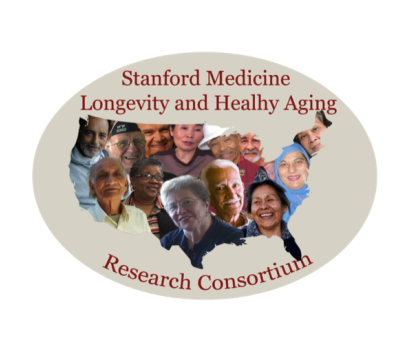Stanford Medicine’s Longevity and Healthy Aging Pilot Grants 2025-2026
Funding Amount: $40,000 in total costs
Project Period: July 1, 2025 – June 30, 2026
Research Projects Must:
- Focus on longevity and healthy aging research
- Include a sociocultural or biobehavioral aspect
- Seek to advance the health and wellbeing of older adults from all backgrounds
Most of our past pilot projects have fallen into one of two buckets:
- Data science projects focused on longevity and healthy aging for older adults from all backgrounds. Prior awardees have successfully used machine learning techniques to improve health and wellbeing of adults and older adults from diverse backgrounds. Research using health information technologies and electronic health records analysis are welcome. We also welcome secondary data analysis of massive national datasets.
- Studies must fit into the NIH definition of the Stage 1 behavioral interventions development model. If you are focusing on a biobehavioral or socio-cultural intervention(s), here are some desirable areas for consideration:
- Testing of mobile apps, wearable devices, and smartphone tools to monitor and manage health and wellbeing
- Telehealth studies culturally adapted for diverse populations including video consultations, secure online platforms etc.
This program is supported with funding from the National Institute on Aging, the Stanford School of Medicine, and the Stanford Department of Medicine.
If you are planning to apply, you may want to contact Dr. Jessica Moon to schedule a consultation. Consultation slots are available between November 10th thru December 20th. During the consultation, Dr. Moon can help you refine your project and address any questions you may have regarding eligibility and submission steps and deadlines. Please click HERE to schedule a 30-minute consultation.
Ready to Apply?
Submit your application directly in the Stanford Funding Opportunities Portal by clicking HERE. (The link works best in Chrome. Applications submitted through the Stanford seed funding site will not be accepted.)
*Important: Applicants from outside Stanford must create an account before accessing the application portal. Please contact limitedsubmissions@stanford.edu for assistance in setting up your account. Please include the subject line: LEARN Pilot Grant.
Stanford 2024 winter close will be observed from Monday, December 23, 2024, through Friday, January 3, 2025. Prospective applicants are strongly encouraged to set up an account by December 19.
- Focus on longevity and healthy aging research
- Include a sociocultural or biobehavioral aspect
- Seek to advance the health and wellbeing of older adults from all backgrounds
We invite early career, independent researchers with appointments at Stanford University (School of Humanities and Sciences Graduate School of Business School of Earth, Energy & Environmental Sciences School of Education School of Engineering Law School, or School of Medicine), VA Palo Alto Health Care System, Palo Alto University, San Jose State University. We are also pleased to consider qualified applicants from any accredited US academic institutions.
Applicants must:
- Hold a terminal degree (e.g., MD, PhD, MD/PhD).
- Be a U.S. citizen, non-citizen national, or permanent resident at the time of application.
- Hold a formal current or pending appointment as an Assistant Professor or equivalent rank at an accredited US institution. Recently appointed associate professors are also eligible to apply.
The L.E.A.R.N. Consortium values multidisciplinary approaches to aging and longevity research, welcoming projects from a wide array of fields, including medicine, computer science, AI/ML, engineering, and beyond. Learn more about our past awardees at L.E.A.R.N. Past Awardees.
Phase 1: Initial Submission
- Deadline: January 10, 2025 (5 pm PT)
- Required Documents: Submit a one-page NIH-style Specific Aims document, CV, and completed application form.
Phase 2: Full Proposal Submission
- Deadline: February 28, 2025 (5 pm PT)
- Requirements: A 3-page Research Strategy, References, Budget, and Justification, along with any updated Phase 1 documents.
Phase 3: Finalist Notification and NIH Submission
- Date: April 1, 2025
- Action: Finalists prepare their application materials for official submission to the NIA as part of LEARN’s RPPR, including human subjects attachments and pilot project forms.
- Eligible Expenses: Budgets may include salaries, research supplies, consulting fees, publication costs, and domestic travel. We encourage applicants to budget funds for travel to the annual RCMAR meeting held during the Gerontological Society of America (GSA) meeting. We also encourage applicants to budget for publication fees, as a primary goal of the award is for the awardees to publish at least one and preferably more peer-reviewed publication in a high-impact journal.
- Ineligible expenses: Examples include equipment, foreign travel, and memberships.
- Indirect Costs: Capped at 8% per NIH guidelines.
